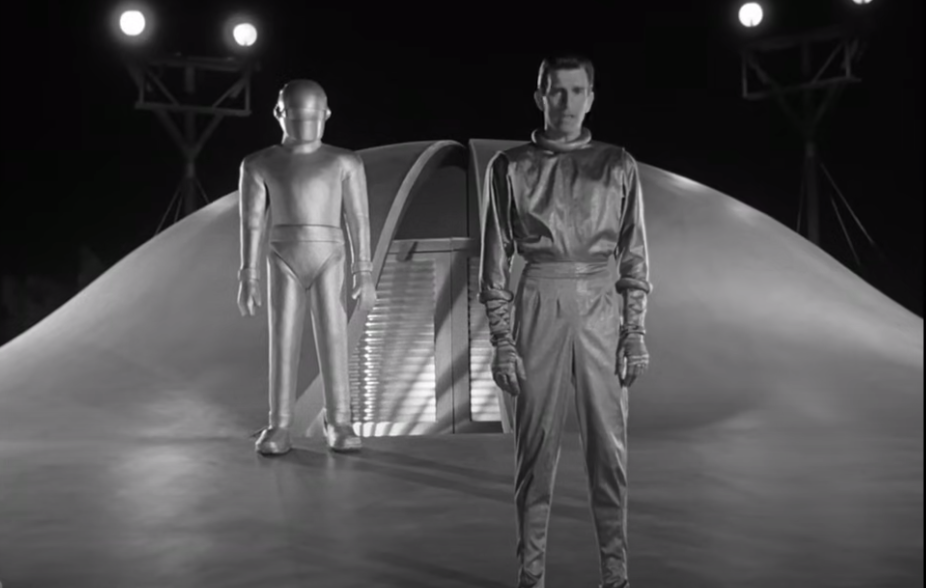
From the ending to the original The Day the Earth Stood Still (1951, Robert Wise director)
Patrick Reany
30 May 2024
The answer to the question: "What is real science fiction?" cannot be made objectively. I can only give my personal opinion to it. So, here goes!
There are six main characteristics of real science fiction:

1) The science fiction genre ought to be the hardest to write for, because it requires technical knowledge of a high scientific accuracy. Writers in this genre should strive for as much scientific accuracy as possible. Thus, not all writers are capable of writing good science fiction. The genres of science fiction include
2) Once you've chosen the genre of science fiction, you have to do world building for the reader or viewer. What kind of people or beings or creatures are in this world? What's the technology like there? Who are the good guys and who are the bad guys? What's the back story on the world you've built? What's the history of the characters and societies/civilizations in the story?
The answer to the question: "What real science fiction is not?" Here goes!
Now, I'm not saying that science fiction cannot contain anything about sex, race, horror, or politics, but those things aren't its focus. I take a more purist view that science fiction is a form of fiction that revolves around speculative science and technology and their implications, and that's all. There's plenty of other genres in the world of fiction to focus on sex, race, horror, or politics.
Intellectual Property (IP).
Remove not the ancient landmark, which thy fathers have set. -- Proverbs 22:28The fact that one may legally purchase someone else's IP (story) and revamp it arbitrarily, does not make it moral to do so. Just how much can we change a purchased IP from a previous author, like Tolkien? Change should be small to the original intent of the IP. Extensions should not contradict the facts, lore, or the morals of the original IP. If you want to radically alter it, why mess with it at all? You're not fooling anyone. Just invent your own story (intellectual property) and thus do what you want with it.
Yeah, you can write science fiction with immoral lead characters, but that's not the science fiction I want anything to do with. Science fiction can portray the negatives of life, but it should always be uplifting and positive in the end. If you want to write about a dark world, go ahead, but leave me out.
Finally, brothers, whatever is true, whatever is honorable, whatever is just, whatever is pure, whatever is lovely, whatever is commendable, if there is any excellence, if there is anything worthy of praise, think about these things. -- Philippians 4:8Yes, the world is full of ugliness, and we need to be aware of it, but we should not think on it so much that it impedes our positive outlook and soundness of thought. There should be something worthy of praise to think on, even if we have to resort to fiction to find it, right?
Final Comments: What about special effects?
For roughly a quarter of a century there has been a tendency to over-use special effects simply because it's more easily done these days. I think that there's a simple rule to use to find the sweet spot when incorporating special effects in a Sci-Fi movie: Remember that the special effects are there to serve the story and not the other way around. Now, I know that these days producers and directors may use special effects for their own sakes to draw in movie viewers or to demonstrate some technical proficiency that might even garner an award, but that's not a movie I'll probably like. But there are exceptions.
I have not yet seen Avatar 2: The Way of Water, but I think I would enjoy the movie if only for its special effects.
I remember way back when the first Jurassic Park (1993, Steven Spielberg director) came out at theaters, and I saw it multiple times because I enjoyed the characters and the special effects. I considered it a privilege to be able to see realistic versions of dinosaurs. However, there is a law of diminishing returns on dino special effects: Even though the special effects used in Jurassic Park 2 and 3 were good, they didn't, indeed couldn't, have the same impact as they did for me in Jurassic Park 1. The novelty of dino special effects was wearing off. It's not anybody's fault; it's just a reality for movie goers.

I'd like to give a humble shoutout to three older sci-fi movies that I think used special effects well:

